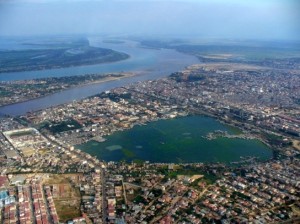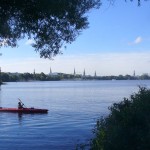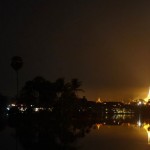The Mirror, Vol. 14, No. 690
The activities to get the lake in Phnom Penh – the Boeung Kak – filled up with sand has been further sped up during the week, resulting in the destruction of houses by machines and by sand. People who had been informed that this might happen, continued their protests, while, on the other hand, such massive, forceful, and violent actions continued. Some of them are now also protesting because they had thumb-printed an agreement in 2007 to get US$8,500 if they move – but they have neither received a copy of the agreement, nor the money, they claim.
All this gets attention in some of the media in the country, and also internationally.
...and the future
In today’s reporting, I want to focus on two different aspects which provide some context to the present tragedy.
When The Mirror reported on 18 January 2008 about related events, together with a picture I had taken, I added the explanation that the lake in Phnom Penh “is contracted to a hardly known Korean company for ‘development’ – 90% are to be filled in and built up.” For a long time, this lake had also served as a reservoir to take in excessive flood water temporarily.
This caption was wrong. Though public land had been contracted to a private company, details were not published, and so the people who started to fear for their future, demonstrated, by mistake, in front of the Embassy of the Republic of Korea – South Korea – asking for understanding. The Korean ambassador had to tell them that they were at the wrong address.
Only later it became clear that the Shukaku company, the main actor, belonged to Mr. Lao Meng Khin, a senator from the Cambodian People’s Party, the husband of Madame Chhoeung Sopheap, known also as Yeay Phou, who are both close to Prime Minister Hun Sen. They had received the right – from the government some say, from the City of Phnom Penh others say – to develop the area of and around the lake – in a 99 years contract.
This resulted in a lot of criticism from the affected people, but also beyond.
If our observations do now have to be corrected, there was only one voice of caution from a top level person: The President of the National Assembly, Samdech Heng Samrin, was quoted to have signed a letter in January 2008, suggesting the temporary suspension of the pumping of sand so that there would be another period of consideration possible.
We did not become aware if or what kind of response the President of the National Assembly received, nor, if the persons affected did also present their grievances to him.
Apart from the human suffering involved, there are also ecological and social problems, which so far do not get much public attention. One might have assumed that not only those who live around the lake, but that a larger number of the inhabitants of the capital city of Phnom Penh might also have expressed their opinion. Some pictures may speak her more clearly than words.
When I was in Germany, I took pictures from the artificial lake Alster, created in the inner city of Hamburg, some two or three hundred years ago. And in spite of the fact that those who planned and implemented the development of New York City – they did not have the possibility to extend the city into surrounding land, because New York is surrounded by water. The situation is different from Phnom Penh, surrounded by land, including the land on the peninsula and on the other side of the Mekong. In New York, they had to build up the famous skyline of skyscrapers high up – but they kept Central Park as piece of nature in the City of New York. And the capital of Myanmar, Yangon, has a beautiful lake.
Central Park in New York/USA
In Phnom Penh, things are being changed into the opposite direction, irreversibly. One can only speculate how future generation will think about the present destruction of this lake.
Have a look at the last editorial – you can access it directly from the main page of the Mirror.
And please recommend The Mirror also to your colleagues and friends.






Recent Comments